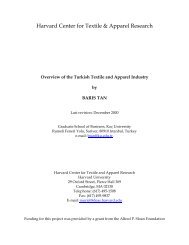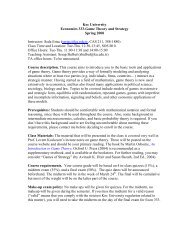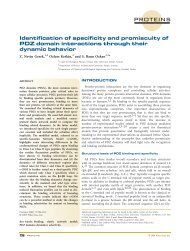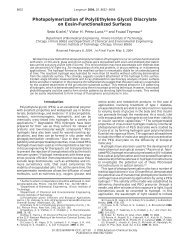Comment on Hekman's "Truth and Method: Feminist Standpoint ...
Comment on Hekman's "Truth and Method: Feminist Standpoint ...
Comment on Hekman's "Truth and Method: Feminist Standpoint ...
You also want an ePaper? Increase the reach of your titles
YUMPU automatically turns print PDFs into web optimized ePapers that Google loves.
<str<strong>on</strong>g>Comment</str<strong>on</strong>g> <strong>on</strong> <strong>Hekman's</strong> "<strong>Truth</strong> <strong>and</strong> <strong>Method</strong>: <strong>Feminist</strong><br />
St<strong>and</strong>point Theory Revisited": Where's the Power?<br />
Patricia<br />
Hill Collins<br />
Y READING OF STANDPOINT THEORY sees it<br />
as an interpretive framework dedicated to explicating how<br />
knowledge remains central to maintaining <strong>and</strong> changing<br />
unjust systems of power. While the main arguments in Susan<br />
<strong>Hekman's</strong> article (in this issue) c<strong>on</strong>tain surface validity, because st<strong>and</strong>point<br />
theory never was designed to be argued as a theory of truth or<br />
method, <strong>Hekman's</strong> article simply misses the point of st<strong>and</strong>point theory<br />
overall. By dec<strong>on</strong>textualizing st<strong>and</strong>poin theory from its initial moorings<br />
in a knowledge/power framework while simultaneously rec<strong>on</strong>textualizing<br />
it in an apolitical discussi<strong>on</strong> of feministruth <strong>and</strong> method, Hekman essentially<br />
depoliticizes the potentially radical c<strong>on</strong>tent of st<strong>and</strong>poin theory.<br />
First, the noti<strong>on</strong> of a st<strong>and</strong>point refers to historically shared, groupbased<br />
experiences. Groups have a degree of permanence over time such<br />
that group realities transcend individual experiences. For example, African<br />
Americans as a stigmatized racial group existed l<strong>on</strong>g before I was<br />
born <strong>and</strong> will probably c<strong>on</strong>tinue l<strong>on</strong>g after I die. While my individual<br />
experiences with instituti<strong>on</strong>alized racism will be unique, the types of opportunities<br />
<strong>and</strong> c<strong>on</strong>straints that I encounter <strong>on</strong> a daily basis will resemble<br />
those c<strong>on</strong>fr<strong>on</strong>ting African Americans as a group. Arguing that Blacks as<br />
a group come into being or disappear <strong>on</strong> the basis of my participati<strong>on</strong><br />
seems narcissistic, egocentric, <strong>and</strong> archetypally postmodern. In c<strong>on</strong>trast,<br />
st<strong>and</strong>point theory places less emphasis <strong>on</strong> individual experiences within<br />
socially c<strong>on</strong>structed groups than <strong>on</strong> the social c<strong>on</strong>diti<strong>on</strong>s that c<strong>on</strong>struct<br />
such groups.<br />
I stress this difference between the individual <strong>and</strong> the group as units of<br />
analysis because using these two c<strong>on</strong>structs as if they were interchangeable<br />
clouds underst<strong>and</strong>ing of a host of topics, in this case, the very noti<strong>on</strong><br />
of a group-based st<strong>and</strong>point. Individualism c<strong>on</strong>tinues as a taproot in<br />
Western theorizing, including feminist versi<strong>on</strong>s. Whether bourgeois liberalism<br />
positing noti<strong>on</strong>s of individual rights or postmodern social theory's<br />
celebrati<strong>on</strong> of human differences, market-based choice models grounded<br />
in individualism argue that freedom exists via the absence of c<strong>on</strong>straints<br />
of all sorts, including those of m<strong>and</strong>atory group membership. Freedom<br />
occurs when individuals have rights of mobility in <strong>and</strong> out of groups,<br />
much as we join clubs <strong>and</strong> other voluntary associati<strong>on</strong>s.<br />
[Signs: Journal of Women in Culture <strong>and</strong> Society 1997, vol. 22, no. 2]<br />
? 1997 by The University of Chicago. All rights reserved. 0097-9740/97/2202-0005$01.00<br />
Winter 1997 SIGNS 375<br />
This c<strong>on</strong>tent downloaded from 212.175.32.130 <strong>on</strong> Tue, 26 Mar 2013 07:55:02 AM<br />
All use subject to JSTOR Terms <strong>and</strong> C<strong>on</strong>diti<strong>on</strong>s



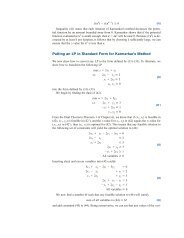
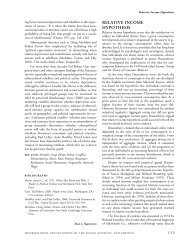

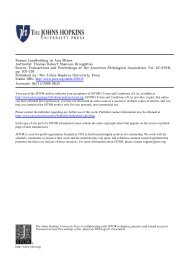
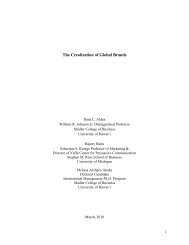

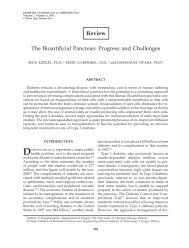
![]_[O](https://img.yumpu.com/10363126/1/190x138/-o.jpg?quality=85)
